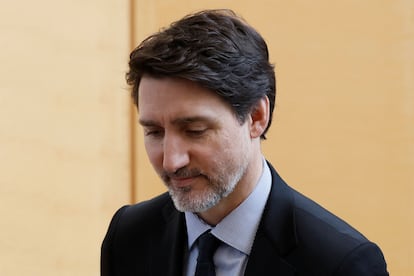Trudeau steps down as leader of Canada’s Liberal Party, will leave office after successor is chosen
His resignation, following the crisis within his government, marks the end of an era and comes as the Conservatives continue to lead in the polls


Canadian Prime Minister Justin Trudeau announced his resignation on Monday following a decline in popularity and a crisis within his government that has left him politically weakened. Trudeau is stepping down as leader of the Liberal Party but will remain as prime minister until a new leader is appointed. Having led the Canadian government for nearly a decade, his resignation marks the end of an era. The Conservative Party, led by Pierre Poilievre, now leads the polls by a wide margin, while the Liberals are in free fall, having lost much of their electorate’s support. Elections must be held by October at the latest.
Trudeau made the announcement outside his red brick Rideau Cottage residence in Ottawa, the country’s capital, in temperatures around 12ºF (-11°C). As he announced his resignation, which had been previously leaked, he sought to defend his leadership. “We are at a critical moment in the world,” he said. “I’ve fought for this country, for you.”
The Canadian politician, who became leader of the Liberal Party in April 2013, led the party to power in October 2015 with a progressive agenda focused on women’s rights and a promise to combat climate change. His platform and personal appeal captivated an electorate that returned the Liberals to power in 2019 and during the early elections of September 2021, though without securing enough seats to govern alone.
Calls for Trudeau’s resignation had been growing since December, when he attempted to remove Finance Minister and Deputy Prime Minister Chrystia Freeland, one of his closest allies, after she opposed his proposals to increase spending. Freeland’s resignation further weakened the prime minister’s position. In her resignation letter, the ousted minister accused Trudeau of engaging in “political stunts” instead of focusing on what was best for the country.
Trudeau, 53, had previously managed to fend off pressure from Liberal lawmakers concerned about the party’s standing in the polls. However, in recent weeks, at least two dozen lawmakers and several regional party groups — including those in Atlantic Canada, Quebec, and Ontario — have called for his resignation.
Earlier, Jagmeet Singh, leader of the New Democratic Party and Trudeau’s main parliamentary ally, had pledged to introduce a motion to bring down the government in the House of Commons. The Conservatives, who have been leading the polls for more than a year, also promised to table a no-confidence motion against the Liberal government. However, along with his resignation, Trudeau has decided to delay the parliamentary session until March 24 to allow time for the appointment of a successor.
Freeland herself, along with new Finance Minister Dominic LeBlanc and former Bank of Canada Governor Mark Carney, are all potential candidates to replace Trudeau. The prime minister has reportedly discussed with LeBlanc whether he would be willing to step in as interim leader and prime minister, the Canadian media outlet Globe & Mail reported on Sunday.
With Trudeau’s resignation, there are also likely to be calls for early elections to establish a stable government capable of effectively facing the Donald Trump administration in the United States over the next four years.
The crisis within Trudeau’s government was further exacerbated by a humiliating incident with Trump, who referred to him as the “governor” of the “Great State of Canada,” implying that Canada was part of the United States. Trump also threatened Canada with imposing 25% tariffs on all imports unless the country halted the flow of drugs and immigrants across its border. In response, Trudeau urgently traveled to Mar-a-Lago, Trump’s mansion in Palm Beach, Florida, in an attempt to mend relations. The United States is the destination for three-quarters of Canadian exports.
Like many Western countries, Canada has spent heavily on combating the effects of the Covid-19 pandemic, significantly increasing its deficit and national debt. However, the sharp rise in prices, a global trend, has further eroded Trudeau’s popularity, particularly due to the overheating of the real estate market and the pressures caused by the massive arrival of immigrants. Despite implementing restrictions on housing purchases by foreigners, the Trudeau government’s efforts have done little to alleviate the problem.
Sign up for our weekly newsletter to get more English-language news coverage from EL PAÍS USA Edition
Tu suscripción se está usando en otro dispositivo
¿Quieres añadir otro usuario a tu suscripción?
Si continúas leyendo en este dispositivo, no se podrá leer en el otro.
FlechaTu suscripción se está usando en otro dispositivo y solo puedes acceder a EL PAÍS desde un dispositivo a la vez.
Si quieres compartir tu cuenta, cambia tu suscripción a la modalidad Premium, así podrás añadir otro usuario. Cada uno accederá con su propia cuenta de email, lo que os permitirá personalizar vuestra experiencia en EL PAÍS.
¿Tienes una suscripción de empresa? Accede aquí para contratar más cuentas.
En el caso de no saber quién está usando tu cuenta, te recomendamos cambiar tu contraseña aquí.
Si decides continuar compartiendo tu cuenta, este mensaje se mostrará en tu dispositivo y en el de la otra persona que está usando tu cuenta de forma indefinida, afectando a tu experiencia de lectura. Puedes consultar aquí los términos y condiciones de la suscripción digital.








































